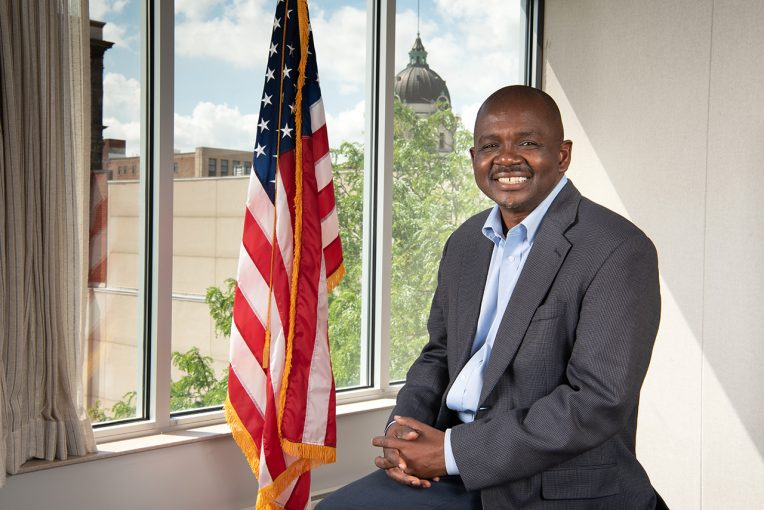Mboka Mwilambwe ’94, M.S. ’96, was a teenager an ocean away when the Rev. Jesse Jackson first ran for president of the United States in 1984.
Mwilambwe, who is from the Democratic Republic of the Congo (then known as Zaire), spent his childhood moving up and down the western coast of Africa due to his father’s work as an international officer for UNICEF. With stays in Senegal, Ivory Coast, and the Republic of the Congo, Mwilambwe was well versed in different cultures and always eager to learn more. He was already envisioning a life of civic engagement.
From afar, he watched Jackson, a Black man, hold well attended rallies in a country that passed the Voting Rights Act just 19 years earlier. Mwilambwe believed doors were opening for people who looked like him in the U.S.
Mwilambwe moved to Central Illinois in 1990. On April 6 of this year, Bloomington residents elected him as the first Black mayor in the city’s near 200-year history. His home country broadcast the news.
He ran as a leader for all, but Mwilambwe understands and embraces the significance of his election.
“To me, it’s really helping younger generations envision the possibilities,” said Mwilambwe, who is also an assistant director at Illinois State University’s Office of Equal Access and Opportunity. “Not just Black, but any gender, race, and ethnicity.”
A U.S. citizen since 2008, Mwilambwe took the oath of office on a strong foundation of public service. A 10-year veteran on the Bloomington City Council, he has been a leader in both the community and at the University, where he enrolled in 1990 shortly after moving to the United States. After receiving his bachelor’s degree in mathematics and his master’s in education, Mwilambwe has stayed in the area raising a family with his wife, Stacey ’94, M.S. ’96, who is the director of University Housing Services.
Mwilambwe pursued the mayorship to be a calming, experienced voice and to help make the surrounding area an attractive place for people to both come and stay.
“One of the things that is encouraging about Mboka is that he’s a seasoned professional who is committed to inclusivity,” said Dr. Touré Reed, a professor of History who has worked with Mwilambwe on numerous occasions at the University. “He has a track record as a public servant that makes clear his professionalism and commitment to Bloomington-Normal, and he brings more to the table than representation.”
Mwilambwe was contemplating stepping out of city politics altogether after representing Bloomington’s Ward 3 for nearly a decade. It was time to give someone else an opportunity, he thought. But that all changed after the onset of the coronavirus (COVID-19) pandemic and George Floyd’s murder last spring. Mwilambwe believed strong leadership was crucial in times of social and economic uncertainties.
Linda Foster, M.S. ’86, president of Bloomington-Normal’s NAACP chapter, said Mwilambwe’s electoral victory signifies that the community and surrounding areas are moving toward inclusion. While she looks forward to a time when the novelty of a first minority politician rising to higher office wanes, she and the local NAACP are excited to work with him.
“We want somebody who believes they can provide our community with great opportunities for all the citizens and that the doors are open for all ideas, thoughts, and beliefs,” Foster said.
To do that, Mwilambwe believes people must learn about each other’s backgrounds and perspectives in order to create connections and bridge divides.
“If you’re going to have to work with people who are different from you, it’s definitely important to understand part of their history and culture and things that are important to them. That tells them you value who they are.”
Mboka Mwilambwe
As a member of the council last July, he proposed making Juneteenth, the nation’s oldest holiday marking the end of slavery, an officially recognized holiday in Bloomington. The resolution passed in October, and the city will now commemorate every June 19 with educational events, presentations, and eventual social gatherings.
The Bloomington-Normal Black History Project, as well as the local NCAACP, City of Bloomington, YWCA, and others, have co-sponsored educational sessions on Zoom all week with a panel discussion and virtual celebration wrapping up the commemoration.
“Society is becoming increasingly diverse,” said Mwilambwe, who is fluent in four languages. “If you’re going to have to work with people who are different from you, it’s definitely important to understand part of their history and culture and things that are important to them. That tells them you value who they are.”
One of his main goals as mayor is to create an atmosphere where people can debate differences civilly. “Disagreeing with each other without dehumanizing each other is an art,” Mwilambwe said. He hopes embracing different cultures and continuing to add viewpoints will create a place where everyone can succeed.
While the work will be plentiful and challenging, he looks forward to leading a community that elected an immigrant from Africa. He hopes residents, whether or not they voted for him, recognize the progress this represents.
“When we do something collectively, like an election, and decide all of the sudden that this person who is very different from most and wasn’t born here is actually the person that we think represents our values, it transcends all those differences,” Mwilambwe said. “That’s the beauty of America.”

